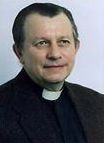Forward in Faith (FiF) is an organisation operating in the Church of England and the Scottish Episcopal Church. It represents a traditionalist strand of Anglo-Catholicism and is characterised by its opposition to the ordination of women to the priesthood and episcopate. It also takes a traditionalist line on other matters of doctrine. Credo Cymru is its counterpart in Wales. Forward in Faith North America (FIFNA) operates in the U.S.
Valid but irregular is a term used in Christian churches which have a concept of Holy Orders, such as the Anglican churches, to sacramental actions by someone who is able, due to their already being ordained to the appropriate orders, to carry out the action but does not have the required authority to do so. The term is analogous to that of "valid but illicit" used in the Roman Catholic Church.

Jesmond Parish Church is a parish church in the Church of England situated in Brandling Village in the Jesmond suburb of Newcastle upon Tyne, Tyne and Wear, England. The church's official name is the Clayton Memorial Church and is unusual among Anglican parish churches in not being named after either a saint who appears in the church's calendar or a person of the Trinity. This reflects the church's conservative Evangelical roots. It is a grade II listed building.
A provincial episcopal visitor (PEV), popularly known as a flying bishop, is a Church of England bishop assigned to minister to many of the clergy, laity and parishes who on grounds of theological conviction, "are unable to receive the ministry of women bishops or priests". The system by which such bishops oversee certain churches is referred to as alternative episcopal oversight (AEO).

St Ebbe's is a Church of England parish church in central Oxford. The church is within the conservative evangelical tradition and participates in the Anglican Reform movement. It has members from many nations, many of whom are students at Oxford University. The rector is Vaughan Roberts who is also an author and conference speaker.

The Reformed Evangelical Anglican Church of South Africa (REACH-SA), known until 2013 as the Church of England in South Africa (CESA), is a Christian denomination in South Africa. It was constituted in 1938 as a federation of churches. It appointed its first bishop in 1955. It is an Anglican church and it relates closely to the Sydney Diocese of the Anglican Church of Australia, to which it is similar in that it sees itself as a bastion of the Reformation and particularly of reformed doctrine.

The Reformed Episcopal Church (REC) is an Anglican church of evangelical Episcopalian heritage. It was founded in 1873 in New York City by George David Cummins, a former bishop of the Protestant Episcopal Church.

The Anglican Diocese of Melbourne is the metropolitan diocese of the Province of Victoria in the Anglican Church of Australia. The diocese was founded from the Diocese of Australia by letters patent of 25 June 1847 and includes the cities of Melbourne and Geelong and also some more rural areas. The cathedral church is St Paul's Cathedral, Melbourne. The current Archbishop of Melbourne since 2006 is Philip Freier, who was translated from the Anglican Diocese of The Northern Territory, and who was the Anglican Primate of Australia from 2014 to 2020.
The Bishop of Ebbsfleet is a suffragan bishop who fulfils the role of a provincial episcopal visitor in the Church of England. From its creation in 1994 to 2022, the Bishop of Ebbsfleet served conservative Anglo-Catholic parishes that reject the ordination of women as priests and bishops. Since 2023, the bishop has served conservative evangelical parishes that reject the ordination and/or leadership of women due to complementarian beliefs.
The Independent Anglican Church (Canada Synod) (IACCS) is an Anglican jurisdiction with a presence in Canada and the United States of America. The Most Rev. Peter Wayne Goodrich of Niagara Falls, Ontario is its Primate. There are several suffragan bishops. The church is not affiliated with the Anglican Communion headed by the Archbishop of Canterbury.
Conservative evangelicalism is a term used in the United Kingdom to describe a theological movement found within evangelical Protestantism and is sometimes simply synonymous with evangelical within the United Kingdom. The term is used more often in the first sense, but conservative evangelicals themselves tend to use it in the second. Conservative evangelicals are sometimes called fundamentalists, but typically reject that label and are keen to maintain their distinct identity, which is more Reformed. Reformed fundamentalism shares many of the characteristics of conservative evangelicalism. In this sense, conservative evangelicalism can be thought of as being distinct from liberal evangelicalism, open evangelicalism, and charismatic evangelicalism. Some conservative evangelical groups oppose women ministers or women preachers in mixed congregations.
The ordination of lesbian, gay, bisexual and/or transgender (LGBT) clergy who are open about their sexuality or gender identity; are sexually active if lesbian, gay, or bisexual; or are in committed same-sex relationships is a debated practice within some contemporary Christian denominations.

Peter Toon was a priest and theologian and an international advocate of traditional Anglicanism.

In Christianity, the ordination of women has been taking place in an increasing number of Protestant and Old Catholic churches, starting in the 20th century. Since ancient times, certain churches of the Orthodox tradition, such as the Coptic Orthodox Church, have raised women to the office of deaconess. While ordination of women has been approved in many denominations, it is still a very controversial and divisive topic.

Church Society is a conservative, evangelical Anglican organisation and registered charity formed in 1950 by the merger of the Anglican Church Association and National Church League. In May 2018, Church Society merged with two other evangelical Anglican organisations, Reform and the Fellowship of Word and Spirit to provide a united voice for conservative evangelicals within the Church of England.

Evangelical Anglicanism or evangelical Episcopalianism is a tradition or church party within Anglicanism that shares affinity with broader evangelicalism. Evangelical Anglicans share with other evangelicals the attributes of "conversionism, activism, biblicism and crucicentrism" identified by historian David Bebbington as central to evangelical identity. The emergence of evangelical churchmanship can be traced back to the First Great Awakening in America and the Evangelical Revival in Britain in the 18th century. In the 20th century, prominent figures have included John Stott and J. I. Packer.

St Andrew the Great is a Church of England parish church in central Cambridge. Rebuilt in late Gothic style in 1843, it is a Grade II listed building. The church has a conservative evangelical tradition and participates in the Anglican Reform movement. The congregation includes Cambridge residents, overseas visitors and students.
Roderick Charles Howell Thomas is a retired Church of England bishop. He was the Bishop of Maidstone, a provincial episcopal visitor for conservative evangelical members and parishes of the church, from 2015 until his retirement in 2022.
The Bishop of Oswestry is a suffragan bishop of the Diocese of Lichfield who fulfils the role of a provincial episcopal visitor in the Church of England.

Christ Church is a Church of England, Evangelical parish church in Paignton, Devon, England. Designed by Walter G. Couldrey and Edward Gabriel, the church was built in 1887–88 and has been a Grade II listed building since 1993.










